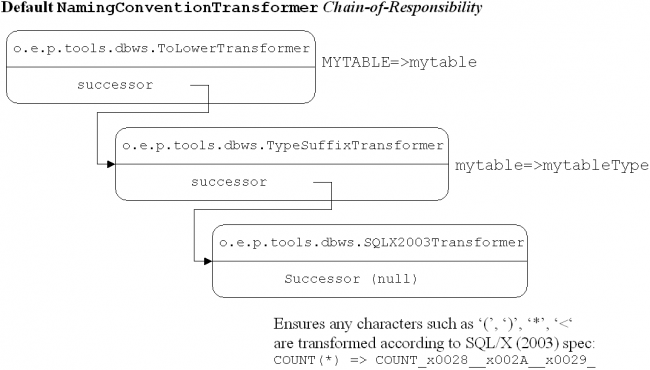Notice: This Wiki is now read only and edits are no longer possible. Please see: https://gitlab.eclipse.org/eclipsefdn/helpdesk/-/wikis/Wiki-shutdown-plan for the plan.
EclipseLink/Examples/DBWS/DBWSIntermediateAttribute
Naming Convention for schema elements
As seen in the Basic Table example, the DBWSBuilder-generated eclipselink-dbws-schema.xsd file derives <element-tag> names from the Database table metadata:
<xsd:schema
xmlns:xsi="http://www.w3.org/2001/XMLSchema-instance"
xmlns:xsd="http://www.w3.org/2001/XMLSchema"
>
<xsd:complexType name="empType">
<xsd:sequence>
<xsd:element name="empno" type="xsd:int" xsi:nil="false"/>
<xsd:element name="ename" type="xsd:string" xsi:nil="true"/>
<xsd:element name="job" type="xsd:string" xsi:nil="true"/>
<xsd:element name="mgr" type="xsd:int" minOccurs="0" xsi:nil="true"/>
<xsd:element name="hiredate" type="xsd:dateTime" xsi:nil="true"/>
<xsd:element name="sal" type="xsd:decimal" xsi:nil="true"/>
<xsd:element name="comm" type="xsd:int" minOccurs="0" xsi:nil="true"/>
<xsd:element name="deptno" type="xsd:int" xsi:nil="true"/>
</xsd:sequence>
</xsd:complexType>
</xsd:schema>
Converting the database metadata into the names of <element-tag>'s is the job of o.e.p.tools.dbws.NamingConventionTransformer's
public interface NamingConventionTransformer { public enum ElementStyle { ELEMENT, ATTRIBUTE, NONE }; public String generateSchemaName(String tableName); public String generateElementAlias(String originalElementName); public ElementStyle styleForElement(String originalElementName); }
In the eclipselink-dbwsutils.jar, the built-in transformers form a Chain-of-Responsibility

In the o.e.p.tools.dbws.NamingConventionTransformer services file, the transformer chain is listed in order:
|
+---META-INF
| | MANIFEST.MF
| |
| \---services
| org.eclipse.persistence.tools.dbws.NamingConventionTransformer
contains 3 lines:
org.eclipse.persistence.tools.dbws.ToLowerTransformer
org.eclipse.persistence.tools.dbws.TypeSuffixTransformer
org.eclipse.persistence.tools.dbws.SQLX2003Transformer
User-Provided NamingConventionTransformer
It is possible to change an <element-tag> to an "attribute" with a custom transformer. The user sub-classes o.e.p.tools.dbws.DefaultNamingConventionTransformer.
For example, given the table SIMPLE_TABLE
ID NUMERIC NOT NULL,
NAME VARCHAR(25),
SINCE DATE,
PRIMARY KEY (ID)
)
NamingConventionTransformer will:
- name the schema element 'simple'
- make the element names lowercase
- have the ID field represented as an attribute
package foo.bar.blah; import org.eclipse.persistence.tools.dbws.DefaultNamingConventionTransformer; import static org.eclipse.persistence.tools.dbws.NamingConventionTransformer.ElementStyle.ATTRIBUTE; import static org.eclipse.persistence.tools.dbws.NamingConventionTransformer.ElementStyle.ELEMENT; import static org.eclipse.persistence.tools.dbws.NamingConventionTransformer.ElementStyle.NONE; public class MyNamingConventionTransformer extends DefaultNamingConventionTransformer { @Override public String generateSchemaAlias(String tableName) { return super.generateSchemaAlias("simple"); } @Override public String generateElementAlias(String originalElementName) { return super.generateElementAlias(originalElementName.toLowerCase()); } @Override public ElementStyle styleForElement(String elementName) { if ("id".equalsIgnoreCase(elementName)) { return ATTRIBUTE; } return ELEMENT; } }
produces the schema:
<xsd:schema targetNamespace="urn:simple" xmlns="urn:simple" elementFormDefault="qualified" xmlns:xsd="http://www.w3.org/2001/XMLSchema">
<xsd:complexType name="simple">
<xsd:sequence>
<xsd:element name="name" type="xsd:string" minOccurs="0"/>
<xsd:element name="since" type="xsd:date" minOccurs="0"/>
</xsd:sequence>
<xsd:attribute name="id" type="xsd:decimal" use="required"/>
</xsd:complexType>
<xsd:element name="simple" type="simple"/>
</xsd:schema>
The user must package their custom transformer in a .jar-file and identify it as a service by creating a file called org.eclipse.persistence.tools.dbws.NamingConventionTransformer in the META-INF/services directory with the full-qualified classname of the transformer:
|
+---META-INF
| | MANIFEST.MF
| |
| \---services
| org.eclipse.persistence.tools.dbws.NamingConventionTransformer
contains 1 line:
foo.bar.blah.MyNamingConventionTransformer
|
\---foo
\---bar
\---blah
| MyNamingConventionTransformer.class
NB - the custom transformer's customtransformer.jar file must be ahead of the eclipselink-dbwsutils.jar in order for it to be picked up by the DBWSBuilder utility. In addition, the DBWSBuilder utility always re-builds the Chain-of-Responsibility with the SQLX2003Transformer at the end to ensure that any transformer, default or custom, produces legal characters according to the SQL/X(2003) specification.
